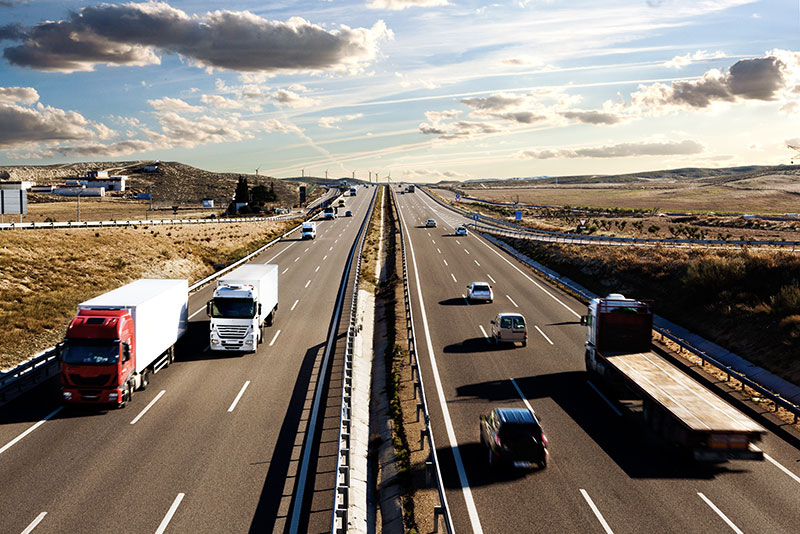Were you or a loved one hurt in a crash with a semi-truck or tractor-trailer?
The physical pain of injuries and the corresponding emotional suffering are overwhelming, but the nightmare of dealing with an insurance company can be even worse. Think about it: the advice many insurance companies give to their drivers is to “never admit fault.”
Many times in trucking wrecks, the trucking company has their own attorneys investigate the scene to get a head start on denying liability. Perhaps you were T-boned by a driver who ran a red light and yet the at-fault driver will deny responsibility.
What’s even more frustrating, the insurance companies know how to use North Carolina’s contributory negligence law to their advantage. Essentially, the insurance company argues that you are at least 1 percent at fault because you should have somehow avoided the collision, and therefore you are entitled to nothing.
In this first meeting, we will discuss these liability issues as well as your compensatory damages, such as medical bills, time out of work, physical pain and emotional suffering.
There are also other important factors to consider, such as punitive damages. For example, if the at-fault driver was drunk, texting or driving in some other reckless manner, you might be entitled to additional damages intended to punish the at-fault driver.
Our Charlotte injury lawyers can help navigate you through the difficult claims process. However, many times it’s necessary to file a complaint in state or federal court in order to obtain fair compensation. Our lawyers have experience litigating cases throughout North and South Carolina.
Beau Wilder has successfully litigated South Carolina cases in the Court of Common Pleas and the District of South Carolina. He has also litigated claims in North Carolina federal courts, superior courts and district courts across the state. Rob Wilder has tried over 200 jury trials to a verdict in North Carolina state and federal courts.
Have more questions?
We’ve got answers.
How truck accidents differ from car crashes
When seeking legal information and representation following a truck wreck, it’s important to consult with an attorney who has specific knowledge and experience pertaining to truck-related accidents and injuries. This is because while there are similarities, truck crash cases differ from collisions between passenger vehicles in several distinctly important ways.
Additionally, if you were a truck driver injured on the job, workers’ compensation benefits may be available to you. We recommend that you refer to our workers’ compensation for truck drivers page.
Severity of the accident and injuries
Truck accident cases tend to involve more serious injuries. Due to their size and weight, semi-trucks, tractor-trailers and commercial trucks often result in catastrophic injuries and death. Such cases require more expertise in calculating not just the immediate costs associated with the crash, but also long-term and permanent treatment and care that the accident victim may require. Also, the greater the severity of injury, the more money is on the line and the higher the stakes—meaning trucking companies and insurers often put up a bigger fight.
Determining who is at fault
Determining liability in truck accidents cases is more complex due to the fact that truck drivers are typically employed by trucking companies, which are often represented by an insurance company. It’s often difficult for crash victims and their families to know who is responsible for paying their damages: the truck driver, the trucking company or the trucking company insurance company. In some cases, multiple parties may be liable.
State and federal regulations
Since commercial trucks are much bigger and more deadly than other vehicles, there are special federal and state safety regulations that truck drivers and trucking companies must follow. If they fail to stay in compliance with these laws and regulations, they may be subject to fines and penalties—on top of being liable for damages. These laws regulate things like how long a trucker can drive in a day, how to properly load and secure cargo, what qualifications commercial truck drivers must have and how often trucks must undergo inspections and maintenance.
Crash data availability
Most people are unaware that many semi-trucks are equipped with data recorders that are similar to the “black boxes” found in airplanes. These recorders can capture important details from moments prior to impact, such as the speed the truck was going, whether brakes were applied, how long the trucker was driving and other information that might be useful when pursuing a claim. By acting quickly, your attorney can help preserve this evidence before it gets erased or tampered with.
Fighting well-funded companies
When going up against a national trucking company or insurance company, individuals are automatically at a disadvantage. Unlike legal disputes between 2 regular drivers, the trucking companies that employ commercial drivers (and their insurers) often have deep pockets and ample resources to challenge and contest your claim. Often, they deny claims simply because they know the injured person doesn’t have the will or resources to fight back. Lawyers representing trucking companies and insurers are highly aggressive and know how to leverage the legal system to their advantage to delay, deny or reduce the compensation you deserve.
What causes truck accidents?
- Alcohol/drugs. In North Carolina, it’s illegal to operate a commercial motor vehicle with a blood alcohol concentration of .04 percent or more. Nevertheless, truckers often take substances to de-stress or keep them awake to drive longer hours. Alcohol and drug abuse account for a significant percentage of fatal truck wrecks, which is why employee drug testing may be required after serious accidents.
- Distracted driving. Truck drivers have lots of distractions in their cab—from cell phones, radios, navigation and dispatch devices to passing billboards and buildings. One 2009 study found that in 71 percent of large-truck crashes, the truck driver was doing something besides driving the truck.
- Reckless driving. Many trucking companies put strict deadlines and expectations on their drivers, pressuring truckers to speed, drive recklessly and disobey federal regulations in order to meet their quota and save their job.
- Drowsy driving. Highway hypnosis is real, especially for long-haul truckers who don’t get enough sleep. When truckers fall asleep at the wheel, it’s usually unsuspecting motorists in the wrong place at the wrong time who pay the ultimate price.
- Defective parts. Tire blowouts and parts failure can happen to any vehicle with wheels, but they are particularly dangerous for 18-wheelers because it can cause the trucker to lose control of their truck and swerve into other vehicles. Truckers should regularly inspect their rig to reduce the likelihood of unexpected blowouts and equipment failure.
- Unsecured/imbalanced loads. While transporting cargo, truckers are responsible for safely getting it from point A to point B. If cargo hasn’t been secured properly and spills onto the road, causing an accident, then the driver, shipping company or trucking company could be liable. The same is true if an imbalanced load causes a truck rollover accident.
Types of truck wrecks
- Rollover accidents. Due to their higher profile and heavy cargo, semi-trucks are more prone to tip. Truck rollovers are frequently caused by improperly loaded cargo, high winds and speeding around tight curves or when turning.
- Underride accidents. An “underride” is when a smaller passenger vehicle crashes into a large truck and gets pinned under the trailer. Underride accidents are among the most deadly types of truck wrecks in the country, despite underride guards being a simple way to prevent such tragedies.
- Jackknife accidents. “Jackknifing” happens when a truck trailer swings out at a perpendicular angle from the cab. This can happen when the truck driver has to make a sudden stop, or wet roads cause the trailer wheels to hydroplane.
- Blind spot accidents. Commercial trucks have bigger blind spots than other vehicles, which is why you should only venture into this dangerous zone briefly when passing a truck. Sideswipe crashes happen when a truck changes lanes and the driver doesn’t see the vehicle in the blind spot.
- Turning accidents. Semis and tractor-trailers need more room to make a turn. If the trucker or another driver isn’t paying attention, they could cause a wide-turn accident when the truck swings out to make a turn or a car gets “pinned” against the turning trailer.
- Rear-end collisions. When trucks are loaded with heavy cargo, they require more time and distance to stop. If the trucker cannot stop in time, their vehicle becomes a wrecking train devastating anything (or anyone) in its path.
- T-bone accidents. If a truck driver or other motorist runs a red light or stop sign, a T-bone crash can happen. These wrecks are particularly deadly to the other motorist due to the size and weight of the truck.
North Carolina truck accident statistics
Charlotte is a pretty great place to live with its good schools, beautiful parks, lower cost of living (compared to other cities), mild weather and endless selection of awesome restaurants, coffee shops and bars. Charlotte is also a hub of commerce, business and trade. This economic development has, in large part, helped drive a massive population boom in recent years. Since the 2010 census, North Carolina’s largest city has grown by nearly a quarter (24.70 percent) and is rapidly approaching 1 million residents.
One of the city’s biggest economic drivers is Charlotte Douglas International Airport (CLT), which ranks 6th nationwide based on operations and is the 10th busiest airport in the nation based on passenger totals. This, along with the city’s extensive interstate network, means that Charlotte roads are packed with 18-wheelers, semis, tractor-trailers and heavy duty trucks at all hours to transport freight and cargo nationwide.

Recent statistics by the North Carolina Trucking Association found that there were 21,220 trucking companies in the state and around 54,400 truck drivers, many of which are based in the Charlotte area. In fact, 1 in 16 jobs in North Carolina are in the trucking industry. What’s more, 85.6 percent of communities in the state depend exclusively on trucks to move their goods.
Perhaps because trucking is so pivotal to local and state economies, politicians and community leaders frequently fail to address the darkside of the industry: truck accidents.
Though less common than passenger-vehicle car accidents, crashes involving semi-trucks, 18-wheelers and tractor-trailers are typically more serious, resulting in higher rates of catastrophic injuries and death. This is because the average large truck is as much as 20 to 30 times heavier than passenger vehicles.
Disturbingly, fatal truck wrecks have been rising in North Carolina in recent years. In 2006, 148 people lost their lives in truck accidents, the highest since 1968. In 2019, there were 4,759 reported crashes involving tractors/semi-trailers in North Carolina, resulting in 61 deaths and 1,109 injuries (more if you include similar vehicle categories). More than 21 percent (1,040) of these crashes happened in Mecklenburg County alone, according to NCDOT statistics.
Compensation for your truck accident injuries
If you or a loved one are among the thousands of individuals and families in North Carolina struggling after being involved in a truck accident, you likely have many unanswered questions about your legal rights to compensation. As the bills start coming in, you may be stressed and panicked about how you will make ends meet and provide for your family.
Insurance might help cover some of your expenses, but what can you do if it falls far short of what you need to fully recover?
The cost of long-term treatment for catastrophic injuries often surpasses what insurance is able to provide. Common examples of catastrophic truck injuries include:
- Traumatic brain injury (TBI)
- Spinal cord injury (paralysis)
- Amputation (loss of limbs)
- Permanent disfigurement
- Back and neck injury (whiplash)
- Internal injury (organ damage)
- Compound bone fracture
- Third-degree burn
- Wrongful death
The good news is that North Carolina’s personal injury law allows truck accident victims and their families to seek monetary compensation for damages like pain and suffering, medical bills and lost wages from the at-fault driver. However, the legal system is full of loopholes and nuances that trucking companies and their insurers commonly exploit to avoid liability and leave hurting families with no compensation, no options and no justice.
Meet our attorneys
Injury Attorneys Serving Injured Workers from Our Offices in Charlotte, NC
Established in 2018 to serve injured workers in North and South Carolina, the Wilder Pantazis Law Group is powered by a team of tried and tested attorneys with decades of experience successfully handling cases across the region. We are dedicated to providing the highest quality of legal services in the areas of workers’ compensation, personal injury, and complex civil litigation.
Client reviews and testimonials
The people working at Wilder Pantazis Law Firm are delightful to work with. They are all friendly, courteous, knowledgeable and very professional. They all make you feel at home in their office and that you are the most important client they have. I would definitely recommend this law firm for your legal needs. They are worth every penny.
– Jackie R.
Highly Recommend
“Beau Wilder was great to work with on my Workers’ Compensation case. He was always available to answer questions and made the process seamless. He went above and beyond in the whole process! Highly recommend letting him help you.”
– Brandon Watts
Fought for My Rights
“Beau Wilder was amazing to work with regarding my workers’ compensation case. Mr. Wilder treated me like family and fought hard for my rights and compensation. I recommend Mr. Wilder for anyone looking for a professional, hardworking and genuine attorney!”
– Daniel Hardin
Honest and Truly Cares
“Ms. Pantazis breaks the mold of the normal attorney. You don’t feel like you need a shower after talking to her. She is friendly, honest and truly cares about her clients. Things didn’t go as well as I wanted but would’ve been worse with anyone other than Annemarie.”
– William Gross
Truck accident FAQ:
Common questions and answers
What should i do after a truck accident?
The actions you take (or fail to take) following a truck wreck can have a major impact on your future injury claim. Be sure to protect your legal rights and prevent further bodily harm by taking these steps:
- Pull over. Remain at the accident scene. It’s a criminal offense to leave a crash that you were involved in. You are permitted to move your vehicle out of the way of traffic; however, only attempt this if you can do so safely and without pain.
- Call the police. Notify local authorities immediately, or ask someone else to call 911 if you cannot. Accident reporting requirements in North Carolina state that you must report a crash you are involved in if it causes injury, death or property damage of $1,000 or more—which is almost always the case when a crash involves a semi-truck.
- Check for injuries. Most truck accidents result in devastating injuries that require emergency medical treatment. If you are seriously hurt, don’t move and wait for an ambulance to arrive to transport you to a hospital. If you are miraculously unhurt, check on your passengers, the truck driver and anyone else who was involved in the crash. Tell the dispatcher if anyone is hurt so they know to send an ambulance.
- Exchange information. If you can do so safely and you aren’t injured, gather the truck driver’s name, contact information and the name of the trucking company that employs them. You’ll also want to take a picture of their CDL license, license plate number and any other identifying information. You may have to provide some information to them as well. If you cannot get this because you or they are injured, the police report should contain this information as well.
- Gather evidence. Again, only if you can do so safely, try to take pictures and video with your phone of any potentially important evidence, such as the damage to your vehicle, damage to the truck, weather and road conditions, debris and cargo scattered over the road, etc. Also, try to find eyewitnesses and write down their contact information so that they can give a statement later.
- See a doctor. Even if you “feel fine,” you should visit a physician as soon as possible since some truck accident injuries have delayed symptoms. The adrenaline and shock response your body experiences after a traumatic event can conceal underlying health conditions, which is why you should be carefully examined by a medical professional.
- Notify your insurance company. Whether or not you think you are responsible for the accident, you should contact your auto insurance company and let them know that you were involved in a crash. Insurance is often the first avenue for recovering compensation to pay for medical bills and property damage, but many insurers will deny coverage if their policyholder waited too long to report the accident. Simply report the accident and stick to the facts—don’t give a recorded statement and under no circumstances should you speak with the trucking company’s insurance agent until you first consulted with your attorney.
- Meet with an attorney. One of the most important steps you should take after a truck accident is to consult with an attorney near you who specializes in these complex cases. At Wilder Law Group, your first consultation is 100 percent free of charge, so it costs you nothing but your time to get answers and figure out your best course of action.
If you needed emergency treatment, you may have been taken to the hospital from the accident scene and unable to complete some or all of the steps listed above. That’s okay. Your attorney can help gather this information after the fact by investigating the accident scene and reviewing the police report.
Avoid apologizing or saying anything that might hurt your case by admitting fault, whether it’s to the other driver, a police officer or an insurance adjuster. Stick to the facts and don’t speculate about who is liable until you’ve had a chance to speak with an attorney.
How long do i have to file a truck injury claim?
In North Carolina, the statute of limitations for most personal injury claims—including truck crashes—is 3 years. In other words, you must file a lawsuit to pursue compensation within 3 years from the date of the crash.
One of the only exceptions is in fatal truck wrecks. In such wrongful death claims, eligible dependents of the deceased have just 2 years to file a claim instead of 3.
Who is liable in a truck accident?
The fact that multiple individuals, companies and other entities can be legally liable for paying truck accident damages is part of what makes these cases so complex. The following parties may be involved in your injury claim:
- Truck driver. If the truck driver is found to be partially or fully responsible for an accident because, for example, they were speeding, driving drunk or fell asleep at the wheel, then they may be personally accountable for any bodily injury and property damage that resulted from their negligent actions.
- Trucking company. Under the legal doctrine of respondeat superior, a trucking company who hired the at-fault truck driver may be liable for accidents caused by their employee. Typically, plaintiffs are better off suing trucking companies than individual drivers because companies have more assets to help pay the award. Additional damages can be issued if it can be proven that the company intentionally cut corners or ignored safety guidelines.
- Truck owner. Sometimes neither the truck driver nor the trucking company actually own the truck involved in an accident. If the cause of the crash can be linked to vehicle malfunction or lack of maintenance, then the owner of the truck might be considered at fault.
- Cargo loader or shipper. Trucking companies sometimes hire third-party cargo loading or shipping companies to pack and secure the freight being transported. If an unbalanced load or unsecured cargo causes an accident, then a shipping company may be brought into the lawsuit.
- Parts manufacturer. Under product liability laws, the manufacturer of a defective part or product can be held liable if the defect causes injury. In the case of truck malfunctions and part defects, such as a tire blowout or brake failure, the manufacturer can be forced to pay damages to the victim or their family.
- Insurance companies. Hopefully, you have auto insurance, which may get involved in seeking compensation for your accident damages. However, the truck driver and trucking company (as well as any other entity involved) also likely has their own insurance. You may be contacted by various adjusters representing these parties.
- Other motorists. Truck drivers aren’t always the only ones responsible for a collision. Perhaps the trucker swerved to avoid another car stopped on the road for no apparent reason, thus sideswiping your vehicle in the next lane over. In cases where another motorist shares some of the responsibility, they and their insurance company will join the lawsuit.
As you can see, there are many possible parties that can be involved in a truck accident. To help determine liability in your case, it’s important you seek legal counsel from an experienced attorney.
What damages can i recover after a truck wreck?
If you are seriously injured in a truck wreck, you can file a lawsuit to seek both economic and non-economic damages, including compensation for:
- Medical expenses (past and future)
- Transportation to/from medical appointments
- Lost wages (past) and loss of earning capacity (future)
- Property damage
- Pain and suffering
- Mental anguish
- Permanent scarring and disability
If you lost a loved one in a fatal crash, you may also seek compensation for funeral and burial expenses, as well as loss of consortium.
What can a truck accident attorney do for me?
While we can’t speak to other law firms, at Wilder Law Group we treat each of our clients like family. Should you choose to hire us, we will immediately begin working on your case by investigating evidence from the accident to determine liability, collecting all medical bills and other expenses you’ve encountered to calculate the full and fair value of your case, managing the deadlines and paperwork needed to pursue your claim, negotiating with the trucking company and insurers on your behalf and building the strongest case possible if we need to go to trial.
In short: We’ll take care of every detail of your case so that you can focus on recovering physically and emotionally.
Have more questions?
We’ve got answers.



 Annemarie Pantazis
Annemarie Pantazis  Rob Wilder
Rob Wilder  Beau Wilder
Beau Wilder 

